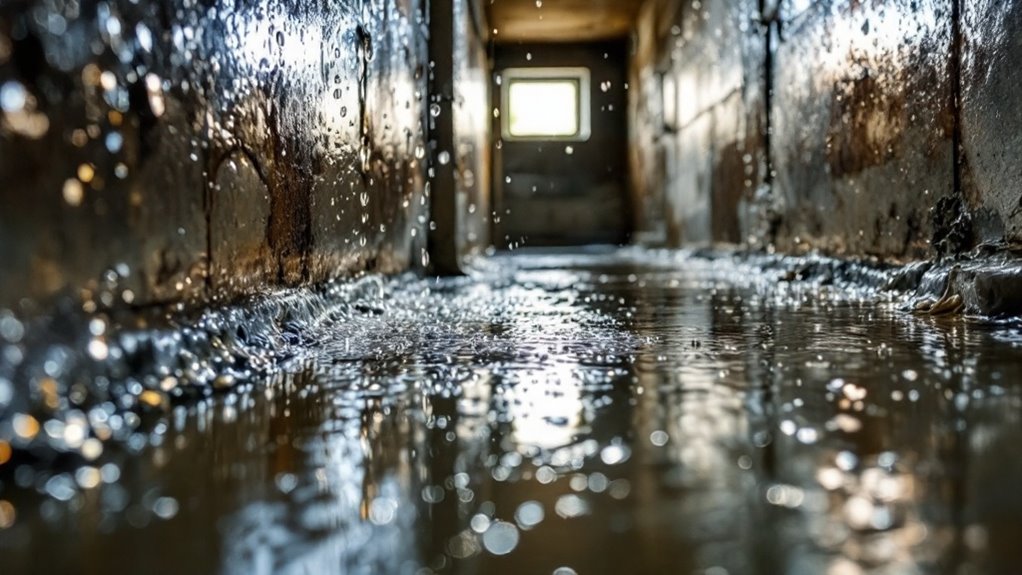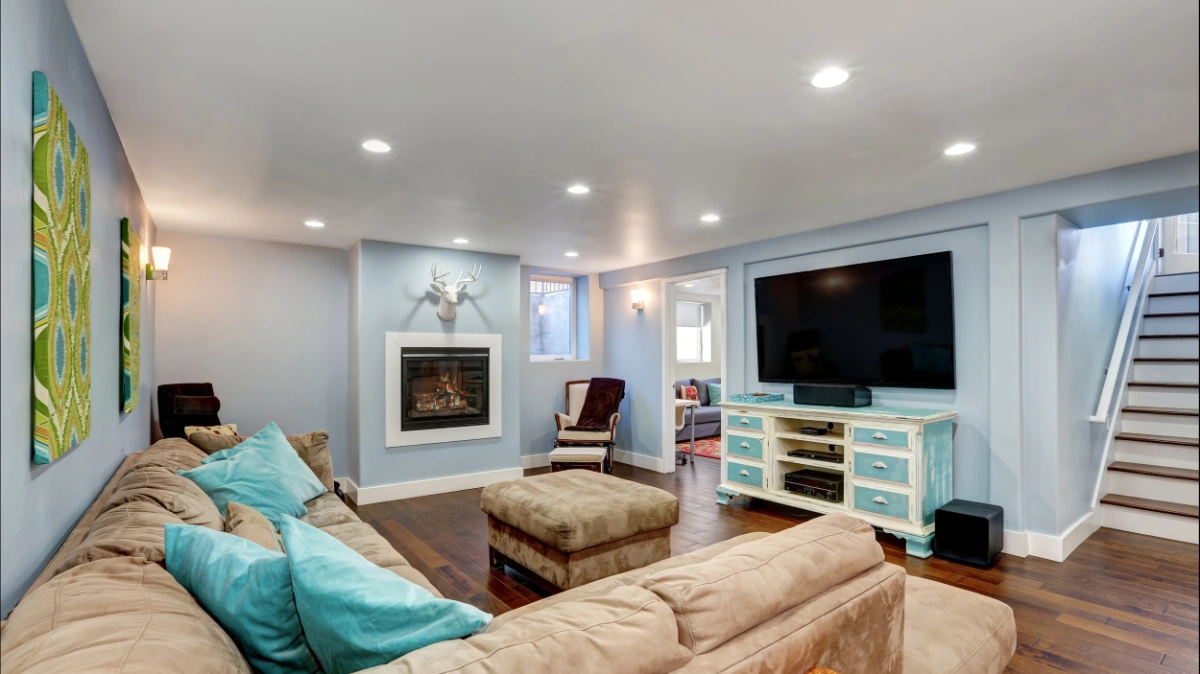Basement waterproofing systems generally last between 5 and 10 years before maintenance is needed. However, with proper care, they can last decades. Factors like climate, soil conditions, and the home’s age affect longevity.
Key components, such as sump pumps, typically need replacement every 7 to 12 years. Regular inspections and professional installation can enhance performance and extend the lifespan.
To learn how to maximize your waterproofing system’s durability, explore the best maintenance practices available.
Key Takeaways
- Basement waterproofing systems typically last between 5 to 10 years before maintenance is needed, with proper care extending their lifespan significantly.
- Sump pumps generally require replacement every 7 to 12 years, while vapor barriers can last over 20 years with proper maintenance.
- Environmental factors like humidity, soil type, and groundwater levels can influence the effectiveness and longevity of waterproofing systems.
- Regular inspections and maintenance, such as testing sump pumps and sealing cracks, are crucial for prolonging the life of waterproofing systems.
- Professional installation is essential for ensuring effective waterproofing, as it addresses root causes and enhances system durability.
Average Lifespan of Basement Waterproofing Systems
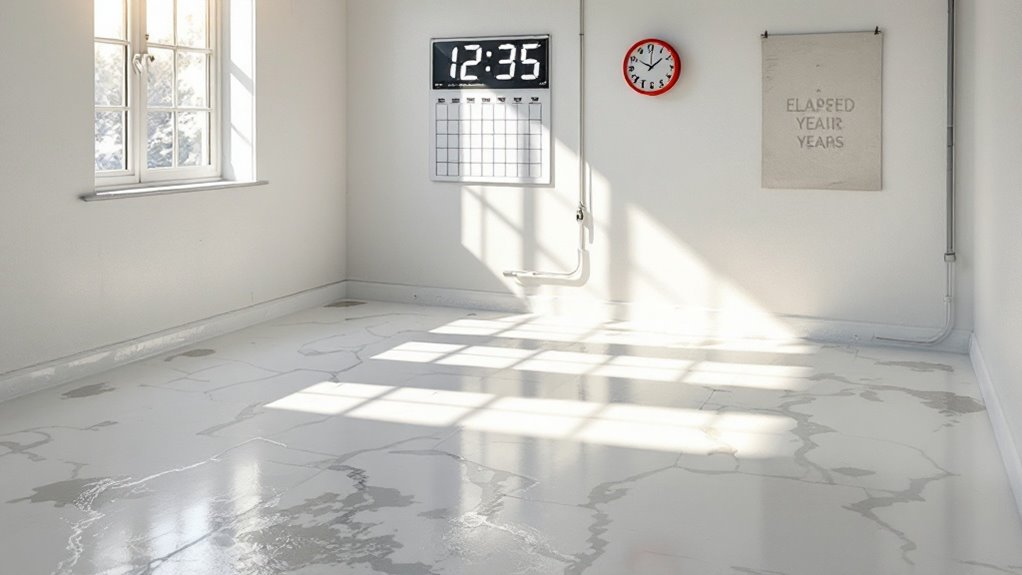
When considering the average lifespan of basement waterproofing systems, you can expect most solutions to last between 5 to 10 years before requiring maintenance.
However, with proper care, some systems can last decades. Factors like climate, soil conditions, and the age of your home greatly influence longevity. Homes in humid regions or near water bodies may face more challenges, while older structures often need more frequent upkeep. Additionally, professional waterproofing systems are recommended for long-term effectiveness and durability.
Key Component Lifespans
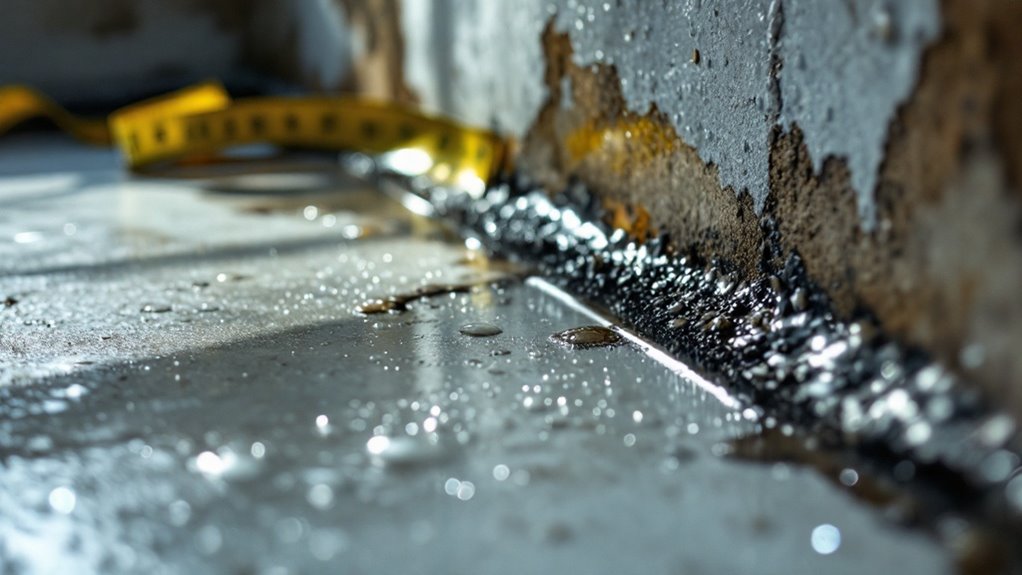
When it comes to basement waterproofing, understanding the lifespans of key components like vapor barriers, sump pumps, and interior drains is essential for effective maintenance.
Professionally installed vapor barriers can last over 20 years, while sump pumps typically need replacement every 10 years. Knowing these timelines helps you plan for inspections and replacements, ensuring your system functions at its best.
Vapor Barriers Longevity
Although many homeowners overlook the importance of vapor barriers, understanding their longevity is crucial for maintaining a dry basement.
Professionally installed barriers typically last over 20 years with proper maintenance, while well-installed options can exceed 10 years.
Material choice matters; bentonite clay solutions often last longer than liquid-applied membranes.
Regular inspections can help you identify issues like seam separations before they escalate.
Verify professional-grade materials are used and seams are properly taped for peak performance.
Remember, replacing torn sections is possible, so don’t wait until moisture becomes a problem.
Proper care can greatly extend your vapor barrier’s lifespan.
Sump Pumps Replacement Cycle
Understanding the replacement cycle of sump pumps is vital for maintaining a dry basement, as these systems typically have an average lifespan of 7 to 12 years.
Frequent use and poor maintenance can shorten this lifespan, so monitoring for signs of wear is essential. Look for indicators like excessive running, mechanical noise, or age over 10 years.
To enhance longevity, perform monthly tests, clear debris, and inspect float switches. Proactive replacement after 7 to 8 years is advisable, especially for high-quality models.
Consider professional installation to guarantee peak performance and reliability in your basement waterproofing efforts.
Interior Drains Durability
While the durability of interior drains is essential for effective basement waterproofing, several factors influence their longevity and performance.
Consider these key components:
- System Design: Advanced designs like BasementGutter™ outperform traditional systems, minimizing clogging.
- Installation Quality: Professional installation guarantees proper slope and sealed joints, reducing leaks.
- Material Durability: High-quality PVC pipes can last over 20 years, while poor materials degrade quickly.
- Maintenance: Regular cleaning and inspections prevent clogs and identify early overload signs.
Factors Influencing Longevity
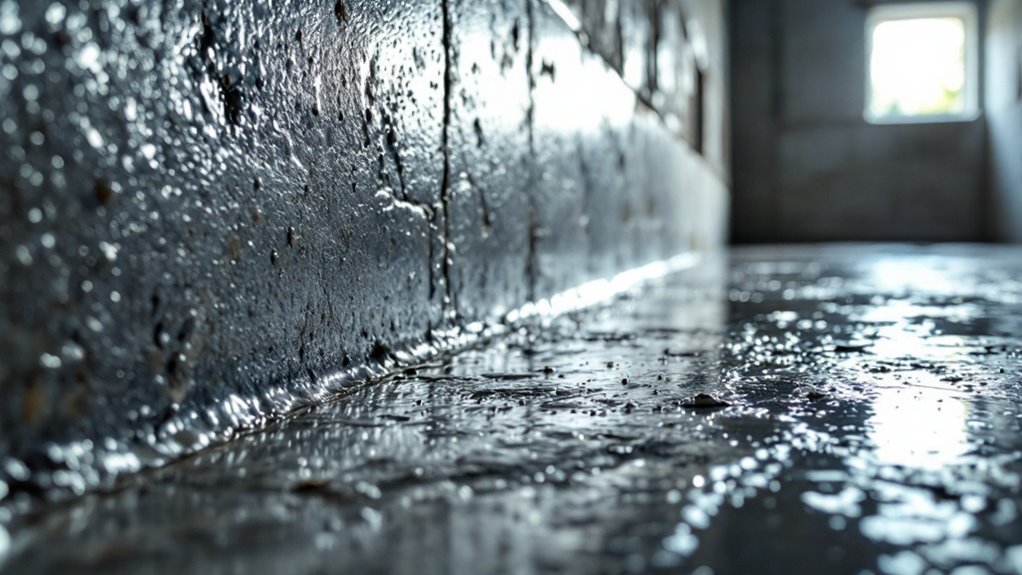
Several factors influence the longevity of basement waterproofing systems, making it essential to take them into account before installation.
The quality of materials plays a key role; high-grade options can last 5–25 years, while low-quality materials may fail early.
Environmental conditions, such as extreme weather and soil pressure, can accelerate degradation. Additionally, groundwater levels and soil type impact the system’s effectiveness.
Regular maintenance, like inspections and prompt repairs, is critical for extending lifespan.
Finally, the condition of your basement before treatment—like existing cracks or structural issues—can greatly affect the performance of waterproofing solutions.
Importance of Professional Installation
Investing in professional basement waterproofing installation guarantees that the protective measures you choose are implemented correctly and effectively. Here’s why it’s essential:
- Structural Integrity: Professionals redirect groundwater, sealing cracks to prevent damage.
- Health & Safety: They eliminate moisture, reducing mold and improving air quality.
- Economic Benefits: Proper installation lowers future repair costs and increases property value.
- Superiority Over DIY: Experts use specialized equipment and extensive systems to address root causes, ensuring long-lasting results.
Choosing professionals not only provides peace of mind but also safeguards your investment against potential issues in the future.
Maintenance Practices for Extended Durability
To guarantee your basement waterproofing remains effective over time, regular maintenance is essential.
Test your sump pump every 3-4 months by pouring water into the pit, and clean it to prevent clogs.
Inspect your foundation for cracks twice a year, sealing small ones immediately.
Maintain gutters and downspouts by cleaning them biannually and verifying proper drainage away from the foundation.
Conduct moisture checks for dampness or odors, especially post-storm.
Finally, verify your yard slopes away from your foundation to prevent water pooling.
These practices help extend the life of your waterproofing system, keeping your basement dry and safe.
Understanding Soil Conditions and Their Impact
Understanding soil conditions is essential for effective basement waterproofing, as hydrostatic pressure can greatly impact your foundation.
If the water table rises or soil absorbs too much moisture, you may face increased pressure that leads to water ingress and structural damage.
Hydrostatic Pressure Effects
While traversing the complexities of basement waterproofing, it’s essential to recognize how hydrostatic pressure is influenced by soil conditions.
Understanding these effects can help you better protect your home.
- Clay soil expands, creating upward pressure on walls.
- Sandy soil drains quickly, but risks settlement due to shifting.
- Pressure intensity varies with groundwater depth and soil thickness.
- Drainage systems, like French drains, counteract clay retention but may be less critical in sandy soils.
Water Table Influence
Hydrostatic pressure isn’t the only factor to contemplate when tackling basement waterproofing; the water table plays a significant role too. Understanding its influence can guide your waterproofing strategy effectively.
| Factor | Impact on Waterproofing |
|---|---|
| Water Table Depth | Shallow tables need more intensive solutions. |
| Seasonal Fluctuations | Wet months increase seepage risks. |
| Soil Type Variations | Clay retains water; sandy allows quick drainage. |
| Construction Impacts | Disrupts natural water flows, raising tables. |
| Foundation Stability | High tables increase lateral pressure, causing cracks. |
So, how long does waterproofing your basement last?
In summary, the longevity of basement waterproofing systems can vary, typically lasting 10 to 30 years, depending on several factors.
By understanding key components and their lifespans, you can make informed decisions. Soil conditions play an essential role, and professional installation guarantees peak performance.
With proper maintenance, you can extend the durability of your system, keeping your basement dry and secure.
Remember, investing in quality now can save you from costly repairs later on.


